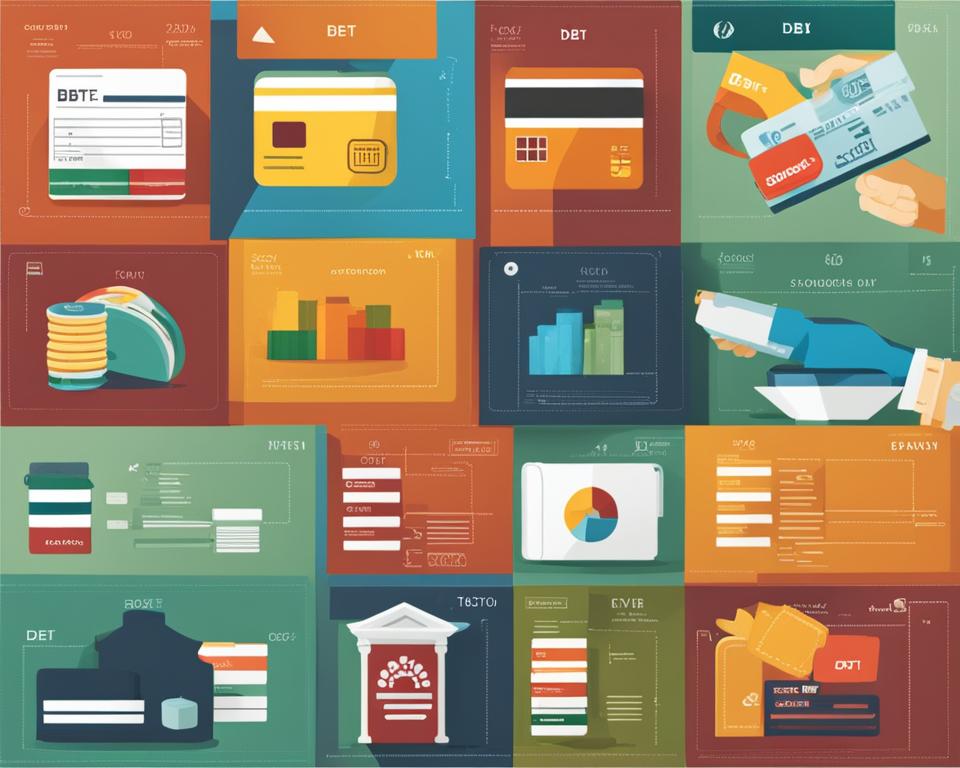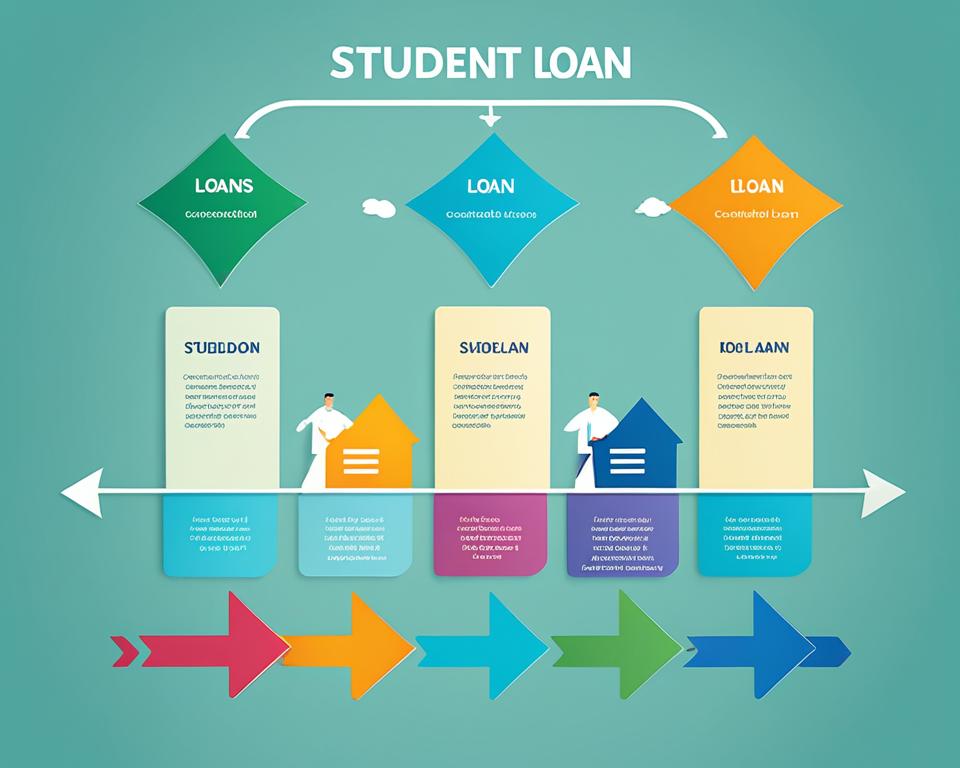When spiraling debts become a looming mountain too steep to climb, many Americans consider debt consolidation as a viable path to financial stability. Understanding the eligibility criteria for debt consolidation programs is the first step toward regaining control of one’s financial landscape. Applicants must navigate through various debt consolidation qualifications that can often include an assessment of credit history, debt-to-income ratios, and proof of stable income.
Loan eligibility criteria for these programs are designed to ensure that individuals are positioned to successfully manage the new consolidated loan and avoid the pitfalls of re-accumulating debt. Furthermore, debt consolidation program eligibility not only aids in obtaining the loan but also plays a crucial role in the terms offered, which can significantly impact the overall benefits of debt consolidation.
Key Takeaways
- Debt consolidation programs demand an individual to meet specified criteria for approval.
- Credit score and debt-to-income ratio are significant factors in determining loan eligibility.
- Types of debts and proof of income are key pieces of the qualification puzzle.
- Ensuring eligibility criteria align with one’s financial situation is essential for successful debt consolidation.
- Navigating program qualifications can result in more manageable loan terms and interest rates.
- Consolidated payments through such programs can lead to improved financial health.
Understanding Debt Consolidation Programs
Embarking on the journey of debt consolidation starts with a critical evaluation of financial circumstances. This process, designed for those grappling with various high-interest debts, merges these obligations into a single loan—often procuring a friendlier interest rate. By understanding the debt consolidation requirements and assessing whether one qualifies for such a program, a path is paved towards financial relief and control.
Introduction to Debt Consolidation
The core idea of debt consolidation involves the strategic combination of multiple debts into one streamlined loan. The objective is simple: to secure a lower interest rate and to provide relief from the cacophony of multiple debt repayments. This introduction to debt consolidation serves as an advisory beacon, guiding those overwhelmed by their fiscal responsibilities towards a more manageable payment structure.
How Debt Consolidation Programs Can Help
For individuals seeking clarity in their financial lives, debt consolidation programs can be a lifeline. Simplification of monthly payments is just the start; potential reductions in overall interest and accelerated debt clearance further contribute to the allure of these programs. Savvy borrowers recognize that consolidating debts is an art — if mastered, it can be a transformative financial strategy, profoundly impacting one’s pursuit of debt liberation.
Potential Impact on Financial Health
The long-term benefits of engaging with a debt consolidation program extend far beyond the immediate ease of payment. The subtle yet significant potential impact on financial health cannot be overstated. As debt is consolidated and payments streamlined, credit utilization may improve, and with consistent payments, credit scores can flourish. Astute attention to these debt consolidation eligibility factors and the disciplined execution of payments can usher in a robust financial renaissance.
To assess the effectiveness of debt consolidation programs for an individual’s situation, consider the following table:
| Consideration | Pre-Consolidation Impact | Post-Consolidation Impact |
|---|---|---|
| Number of Monthly Payments | Multiple payments to various creditors | One consolidated payment |
| Interest Rates | Varied, often high | Lower, standardized rate |
| Credit Utilization Ratio | Potentially high due to multiple balances | May decrease as consolidation pays off debts |
| Debt Repayment Term | Several different terms | Single term, potentially shorter than original debts |
A thorough understanding of the implications and the loan approval requirements involved in these programs ensures that individuals are making educated decisions toward enhancing their financial well-being.
What are the eligibility criteria for debt consolidation programs or loans?
When considering debt consolidation as a financial remedy, understanding eligibility criteria is critical. A variety of factors play into one’s qualifications for these programs, and these factors must be carefully assessed before applying. Among these, credit score, debt levels, income stability, and types of debt are paramount.
A credit score is often the initial metric lenders consider. It impacts not only the chances of approval but also determines the interest rate of the consolidated loan. Higher scores are correlated with more favorable terms. Conversely, lower scores may still allow for consolidation but can lead to increased borrowing costs.
| Credit Score Range | Impact on Eligibility | Expected Terms |
|---|---|---|
| Excellent (720+) | Highest Eligibility | Most Favorable Rates |
| Good (690-719) | High Eligibility | Favorable Rates |
| Fair (630-689) | Moderate Eligibility | Slightly Higher Rates |
| Poor (300-629) | Lowest Eligibility | Unfavorable Rates |
Individuals seeking consolidation must also consider their debt-to-income (DTI) ratio, which signifies the portion of income that goes towards paying off debt each month. Generally, a low DTI ratio is preferred as it indicates a balance between income and outstanding debts and amplifies the chances of loan approval and beneficial terms.
Stable income is a crucial factor in the eligibility equation for debt consolidation. Lenders look for consistent and reliable income as proof that the borrower can adhere to the new loan’s payment schedule.
- Employment (Full-time or Part-time)
- Self-Employment
- Regular government benefits
Finally, the type of debts held by an individual influences the eligibility. Debt consolidation programs tend to focus on unsecured debts such as credit cards, medical bills, and personal loans rather than secured debts like mortgages or auto loans.
It’s imperative for those interested in consolidating their debts to understand what are the eligibility criteria for debt consolidation programs or loans to gauge the likelihood of approval and terms. By meeting these criteria, individuals can streamline their finances, potentially reduce their interest rates, and move towards financial stability.
The Role of Credit Scores in Debt Consolidation
When considering the path of debt consolidation, understanding the profound impact of credit scores on the process is essential. Credit scores serve as a financial report card, encapsulating one’s creditworthiness, and play a pivotal role in determining debt consolidation eligibility factors, as well as the terms and interest rates of potential consolidation loans.
Minimum Credit Score Requirements
To access the most advantageous terms for a debt consolidation loan, a credit score in the realm of 700 or higher is typically necessary. Meeting the minimum credit score requirements can significantly affect the interest rate offered, which in turn influences the overall cost of the loan. It is important to note, however, that even with a score below this threshold, options are available, though they might carry higher rates.
Improving Your Credit Score for Better Rates
Proactively improving your credit score is a strategic approach for obtaining better rates on debt consolidation loans. This involves diligent financial behavior, such as settling bills in a timely manner, resolving discrepancies on your credit report, and maintaining lower balances on credit cards to keep credit utilization rates in check.
- Pay all existing debts on time to avoid negative marks on your credit report.
- Regularly check credit reports for errors and dispute inaccuracies promptly.
- Maintain credit card balances well below the limits to improve your credit utilization ratio.
Adhering to these methods can lead to a marked improvement in your credit score, thereby strengthening debt consolidation qualifications and securing more favorable loan conditions.
| Credit Score Range | Impact on Debt Consolidation | Expected APR Range |
|---|---|---|
| 750 and above | Eligible for lowest rates | 5-10% |
| 700 – 749 | Competitive rates | 10-15% |
| 650 – 699 | Higher rates; may require additional qualifications | 15-20% |
| Below 650 | May face substantial rates or not qualify | 20% and above |
Ultimately, those keen on consolidating debt should prioritize not just meeting the minimum credit score requirements but also continuing to foster habits that will lead to an ever-improving credit score. This conscientiousness will significantly impact the financial benefits they can reap from debt consolidation options.
Evaluating Your Debt-to-Income Ratio
Understanding your debt-to-income ratio (DTI) is of paramount importance when considering your loan eligibility criteria. This financial benchmark measures the proportion of your gross monthly income that goes towards paying off debts. The lower your DTI, the more favorably lenders tend to view your application, as it suggests a more manageable debt load relative to your income. Let’s break down why this ratio matters and how you can calculate it to assess your loan eligibility prospects.
To calculate your DTI, you’ll need to tally your monthly debt payments and divide that by your gross monthly income. Below is a simple table example of how lenders might evaluate loan candidates based on DTI percentages.
| DTI Percentage | Financial Health Indicator | Impact on Loan Eligibility |
|---|---|---|
| 20% or Lower | Excellent debt management | Highest chance of loan approval with competitive rates |
| 21% – 35% | Healthy management, reasonable debt levels | Good chances of approval with standard rates |
| 36% – 50% | Needs attention, debt may be burdensome | Possible approval with potentially higher interest rates |
| Over 50% | Excessive debt burden | Loan approval is unlikely, consider debt relief options |
If your DTI is high, don’t be disheartened. There are actionable steps you can take to lower your ratio, such as increasing your income, paying down debts, or both. By proactively managing your financial obligations and boosting your income, you can improve your DTI, making you a more attractive candidate to lenders.
Remember, a favorable debt-to-income ratio is a critical component of a strong financial profile and can greatly influence your ability to qualify for loans. Regularly evaluate your DTI to stay on top of your financial health and work towards your goal of loan eligibility and optimal financial freedom.
Comparing Secured and Unsecured Debt Options
When evaluating debt consolidation options, it’s pivotal to understand the differences between secured debt consolidation loans and unsecured debt consolidation loans. Each carries its own set of risks and benefits. An informed decision can greatly impact your financial journey, especially when it comes to qualifying for a debt consolidation program.
Secured Debt Consolidation Loans
Secured loans are backed by collateral, which is an asset like a home or car that the lender can claim if the borrower fails to repay the loan. This form of asset evaluation for loans typically results in lower interest rates because the lender has a tangible security that reduces their financial risk. However, this does mean that as a borrower, you risk losing a significant asset if you find yourself unable to keep up with payments.
Unsecured Debt Consolidation Loans
In contrast, unsecured loans don’t require you to put up any collateral. These loans are more heavily based on your credit history and income, which means that lenders may charge higher interest rates to offset their higher risk. The advantage of unsecured loans lies in the absence of linked assets, ensuring that none of your property is directly at risk should you default on the loan.
Understanding the nuances of both secured and unsecured consolidation options is critical in taking a step towards debt relief. Assessing one’s financial stability and weighing the pros and cons of each type can guide borrowers towards making the most beneficial choice for their individual circumstances.
Income Verification for Loan Approval
For anyone considering debt consolidation, understanding the importance of income verification for loan approval is critical. Lenders scrutinize your income sources to ensure you have the financial capacity to uphold the new loan terms. This process is integral to obtaining the green light on your loan application.

Types of Income Considered
Lenders extend their evaluation beyond your primary paycheck to encompass a variety of income streams. This comprehensive approach considers types of income such as your regular salary, part-time earnings, and even freelance income. For individuals receiving consistent bonus or commission payouts, these figures are also part of the income calculation. Recognizing the full scope of one’s earnings gives a more accurate representation of financial resilience.
Proof of Income Documents
To substantiate your income claims, you will be asked to produce a set of proof of income documents. These are pivotal in determining your eligibility for the loan. A few commonly requested documents include:
- W-2 forms that detail your annual earnings and taxes withheld, typically for those in traditional employment
- 1099 forms, often for contractors or part-time workers receiving non-salary income
- Recent pay stubs that highlight current earnings and serve as a snapshot of your financial status
- Tax returns that offer a comprehensive look at your yearly income and tax obligations
Each of these documents plays its own part in painting a full picture of your economic standing, providing lenders with the confidence they need to proceed with your application.
Asset Evaluation for Securing Loans
When entering the realm of secured debt consolidation loans, an integral step is the process of asset evaluation for securing loans. Lenders meticulously appraise the value of assets that borrowers present as collateral. Assets typically include real estate, vehicles, investment portfolios, and other high-value items that can be liquidated if the borrower defaults on the loan.
Assets are scrutinized to ensure their value adequately protects the lender’s financial interests. This safeguard reduces the risk lenders undertake, allowing them to potentially offer lower interest rates compared to unsecured loans. This evaluation is not just a formality: it directly affects the terms and viability of the loan.
- Real Estate: Appraisals consider current market trends, property condition, and location.
- Vehicles: Value is assessed based on age, mileage, make, model, and market demand.
- Investments: Stocks, bonds, or mutual funds are evaluated for their present and potential future worth.
Understanding the implications of securing assets against a loan is crucial for borrowers before entering into such agreements, as failure to repay the debt could mean forfeiture of these vital assets. The lender’s evaluation process ensures that only those assets that meet their stringent criteria, and thus properly secure the loan amount, are accepted as collateral.
Navigating Loan Terms and Interest Rates
When embarking on the journey of debt consolidation, gaining a deep understanding of APR and loan terms is a keystone in making an informed decision. It’s not just about merging debts—it’s about sculpting a new financial path that can lead to significant savings and a more secure fiscal future. The annual percentage rate, or APR, is a pivotal figure that represents the total cost of borrowing, encapsulating interest and other loan charges.
Understanding APR and Loan Terms
The intricacies of APRs and loan terms can often be perplexing. However, they hold the potential to make or break the success of your consolidation strategy. A loan with a favorable APR extends beyond surface-level attractiveness and delves into long-term advantages, potentially easing the financial burden imposed by high-interest liabilities.
To grasp the full scope of the opportunities presented by debt consolidation, it’s essential to dissect the details encoded in the APR. This not only includes the nominal interest rate but also other fees that accompany a loan. A lower APR indicates that less will be paid on top of the borrowed amount over time, thereby enhancing the solvency of the borrower’s financial landscape.
Calculating Potential Savings with Consolidation
One of the primary debt consolidation requirements is to quantify the potential savings that a single, consolidated loan can offer. Wrestling with various interest rates and different payment deadlines each month not only takes a toll on one’s peace of mind but also on the wallet. Therefore, pinpointing the potential for saving becomes an empowering exercise.
By leveraging online calculators or consulting with financial experts, individuals can foster a clear vision of how much they might save. These tools take into account current debts and juxtapose them with the proposed consolidated loan’s terms, elucidating the financial trajectory. Calculating potential savings with consolidation isn’t just fancy arithmetic—it’s a tangible way to measure progress towards the oasis of financial freedom amid the desert of debt.
Debt Types Eligible for Consolidation
When it comes to simplifying finances and reducing interest rates, debt consolidation stands out as a prudent strategy for many. It’s critical to understand the variety of debt types that are eligible for such programs, enabling informed decisions on managing one’s financial obligations effectively.

Credit Card Debt and Loans
Among the myriad of debts, credit card debt and loans are typically the most frequently consolidated due to their higher interest rates, which can spiral out of control if not addressed effectively. By combining these debts into a single loan with a lower interest rate, individuals can potentially save money and simplify their monthly payments. Personal loans, often categorized as unsecured debt, also fall into the spectrum of debt types eligible for consolidation, providing an avenue for financial relief and organization.
Student Loans and Medical Bills
Student loans and medical bills carry their own set of challenges and considerations; however, with certain stipulations, they too can be integrated into a debt consolidation plan. It’s important to navigate the specific conditions such as federal loan repayment opportunities or potential negotiation processes for medical bills before electing to consolidate these particular debts. Understanding the benefits and potential drawbacks is essential for those evaluating their debt consolidation program eligibility involving these debt categories.
Debt Consolidation Program Providers
When seeking relief from mounting debts, individuals face the critical choice of selecting the right provider for debt consolidation programs. With a myriad of options available from traditional banks, member-oriented credit unions, to user-friendly online lenders, the decision hinges on understanding each institution’s unique advantages and loan approval requirements.
Choosing Between Banks, Credit Unions, and Online Lenders
Deciding where to secure a debt consolidation loan involves balancing the credibility of the institution and the flexibility of the financial product. Banks typically boast longstanding reputations and stability, whereas credit unions might offer more personalized service with potentially lower rates for their members. On the digital front, online lenders provide convenience and fast prequalification processes—features that appeal to the tech-savvy borrower looking for swift debt consolidation eligibility factors.
Identifying Reputable Debt Consolidation Services
To safeguard against predatory practices and to secure favorable terms, identifying reputable debt consolidation services becomes paramount. Research tools play a pivotal role in this endeavor, helping to parse through customer experiences and official complaints that signal the reliability of potential lenders.
| Provider Type | Typical Interest Rates | Service Features | Approval Factors |
|---|---|---|---|
| Banks | Competitive | Personalized Loan Options, In-Branch Assistance | Credit Score, Debt-to-Income Ratio |
| Credit Unions | Lower Rates for Members | Community-Based, Member Benefits | Membership Status, Financial Standing |
| Online Lenders | Varies Widely | Quick Prequalification, Digital Management | Online Application, Minimal Documentation |
In conclusion, the journey towards consolidating debt requires a patient and informed approach to choose the right partner. By meticulously assessing banks, credit unions, and online lenders while prioritizing debt consolidation eligibility factors, borrowers can stride forward with confidence towards achieving financial stability.
Strategies to Improve Eligibility
For those aiming to enhance their fiscal health, identifying effective strategies to improve creditworthiness is essential, particularly when it comes to qualifying for debt consolidation programs. Both debt management plans and consolidation loans possess unique benefits and can significantly influence an individual’s credit score and financial stability.
Debt Management Plans vs. Consolidation Loans
Choosing between a debt management plan and opting for a consolidation loan can significantly affect one’s path to financial recovery. Whereas debt management plans, facilitated by credit counseling agencies, focus on negotiating with creditors to lower interest rates and monthly payments, consolidation loans aim to combine all outstanding debts into a single loan, typically with a lower interest rate. While debt management plans are designed as a service that includes financial education, consolidation loans are a financial product that shifts existing debt into a new form, which can prove beneficial in streamlining and simplifying debt repayments.
The choice between the two hinges on one’s unique financial situation—including the amount of debt, credit score, and financial discipline. It’s important to weigh the pros and cons: debt management plans do not reduce the principal owed but might offer more structure and support for budgeting, whereas consolidation loans can reduce the number of creditors you owe and could potentially offer a lower overall interest rate, impacting short-term financial adjustments for long-term gains.
Short-term Financial Adjustments for Long-term Gains
Short-term financial adjustments are often necessary to bolster one’s qualification prospects for these programs. This could include aggressive budgeting, cutting non-essential spending, and prioritizing high-interest debt repayments. Though such measures can be demanding, they serve as investments into one’s creditworthiness, reducing the debt-to-income ratio and improving the chance of qualifying for a debt consolidation program.
- Review and reduce monthly subscriptions or recurring non-essentials
- Allocate any windfalls, such as tax refunds, to debt repayment
- Consider freelance or part-time work for an additional income stream
Though at times it may require a frugal lifestyle, the end goal of these adjustments is to lay a stable financial foundation for when you apply for a debt consolidation loan. The stronger your financial profile, the more likely you’ll be able to secure favorable loan terms.
Prequalification and Soft Credit Inquiries
Understanding the right approach to securing a debt consolidation loan begins with prequalification, a crucial step that involves soft credit inquiries. Unlike hard inquiries, which can affect your credit score, soft inquiries provide borrowers with the necessary foresight into potential loan terms without leaving a mark on their credit history. This process is critical for those who are carefully monitoring their credit while considering their debt consolidation requirements.
Prequalification provides a snapshot of what borrowers might expect in terms of loan amounts, interest rates, and repayment periods, allowing them to assess the feasibility of a debt consolidation loan for their particular financial situation. It’s an opportune moment to weigh the benefits of consolidation against long-term financial goals.
| Prequalification Aspect | Importance to Borrower |
|---|---|
| Loan Amount Estimate | Assesses how much debt can be consolidated |
| Interest Rate Forecast | Gauges potential savings on interest payments |
| Repayment Term Scope | Provides a timeline for debt repayment |
As borrowers consider various debt consolidation options, they should actively seek out lenders that offer prequalification with soft credit inquiries, thus ensuring their credit standing remains unaffected throughout the initial phases of inquiry.

The process of prequalification is designed to protect consumers, providing them with a transparent outlook on potential financial moves. By prioritizing this step, individuals can make informed decisions regarding their debt management, setting the stage for a successful application process and a roadmap to becoming debt-free without unintended detours in their credit journey.
Steps to Take Before Applying for Consolidation
Embarking on a journey towards financial stability often begins with the crucial step of consolidating debt. Before diving into this process, it’s imperative to lay the groundwork for a successful debt consolidation strategy. Knowing the full scope of your financial obligations and assessing your spending habits helps to determine your eligibility for a debt consolidation program and shapes the path to improved fiscal health.
List Out All Debits and Payments
Creating a comprehensive inventory of debts and recurring payments is instrumental in establishing a solid foundation for debt consolidation. This not only includes noting down the overall debt amounts but also involves a keen look at the interest rates tied to them and the necessary monthly payments to keep them in good standing.
| Creditor | Amount Owed | Interest Rate | Monthly Payment |
|---|---|---|---|
| Credit Card Company A | $5,000 | 19.99% | $150 |
| Personal Loan B | $10,000 | 14.55% | $200 |
| Auto Loan C | $15,000 | 5.99% | $300 |
Analyze Current Budget and Spending
To evaluate your current fiscal landscape, analyzing your budget and expenses reveals crucial insights. Scrutinizing spending patterns paves the way for prudent financial choices and identifies areas where expenditure can be limited. Redirecting funds towards debt payoff is a strategy that improves eligibility for debt consolidation and fortifies financial discipline for the road ahead.
- Housing Expenses: Rent or mortgage, utilities, and insurance.
- Daily Living: Groceries, transportation, and healthcare.
- Discretionary Spending: Dining out, entertainment, and personal indulgences.
To bolster eligibility, it’s beneficial to incorporate strategies such as developing a budget or seeking the guidance of a financial advisor. By doing this, one creates a plan not only for a successful consolidation but also for a sustainable financial future.
Alternatives to Debt Consolidation Programs
For consumers who might not be eligible for traditional debt consolidation programs or who desire alternatives that could better suit their financial scenario, there are other viable options. Exploring these alternatives can provide different avenues for streamlining debt repayment and potentially improving financial health.
Debt Settlement and Negotiation
Debt settlement and negotiation stand as a debt consolidation alternative, particularly beneficial for those who find themselves unable to secure conventional consolidation loans or looking to reduce their overall debt obligation. This process involves negotiating with creditors to settle debts for a lower amount than what is owed. While this can relieve some financial burdens, it’s important to consider the potentially negative implications on credit scores. Consumers should carefully weigh the pros and cons before pursuing debt settlement.
Balance Transfer Credit Cards
Another strategy includes utilizing balance transfer credit cards, which offer no or low interest rates for a set introductory period. This can be an effective way to consolidate and pay off high-interest credit card debts, provided that the transferred balance can be fully repaid before the promotional period expires and standard interest rates apply. Detailed planning and budgeting are crucial for taking full advantage of the interest-free period and avoiding further financial stress.
| Debt Solution | Benefits | Considerations |
|---|---|---|
| Debt Settlement | May reduce the total amount owed | Can negatively affect credit scores |
| Balance Transfer Credit Cards | Possibility to pay off debt during a 0% APR introductory period | Need to repay before the intro period ends to avoid high APRs |
Conclusion
In wrapping up our exploration of debt consolidation, we recognize that navigating the roadmap to eligibility is tantamount to achieving sustainable financial health. Identifying the critical loan eligibility criteria, such as creditworthiness and income stability, equips consumers with the knowledge to start this journey on a sure footing. A borrower’s awareness of debt consolidation qualifications can significantly streamline the process, offering clarity on the documentation and fiscal discipline required to move forward effectively.
Moreover, understanding the various debt consolidation eligibility factors is invaluable. It includes the type of debts that can be consolidated, an individual’s debt-to-income ratio, and the role of credit scores in securing favorable loan terms. With these elements in focus, consumers are better poised to make informed decisions, whether they are seeking loan consolidation or evaluating alternative debt reduction strategies.
Ultimately, the effective culmination of a debt consolidation plan rests on thorough preparation and steadfast adherence to a structured repayment schedule. Such fiscal responsibility not only ensures the successful consolidation of debts into manageable payments but also sets the stage for long-term financial resilience and prosperity.
FAQ
What are the basic eligibility criteria for debt consolidation programs?
The basic eligibility criteria for debt consolidation programs typically include a minimum credit score requirement, a reasonable debt-to-income ratio, stable income, and in some cases, the type of debts you have. Some programs may also require collateral for secured loans.
How does my credit score affect my eligibility for debt consolidation?
Your credit score is a key factor in determining your eligibility for a debt consolidation program. It influences the interest rate you qualify for and whether you are considered a high-risk borrower. A higher credit score often means better loan terms and lower interest rates.
Can I consolidate my credit card debt and student loans together?
Yes, you can typically consolidate credit card debt along with other unsecured loans. Consolidating student loans may have additional considerations, especially if they are federal loans, so it’s important to review any special terms or conditions associated with them.
What are secured and unsecured debt consolidation loans?
Secured debt consolidation loans require collateral, such as property or another asset, which can be used to repay the loan if you default. Unsecured loans do not require collateral, and approval is based primarily on creditworthiness.
What income documents are needed when applying for a debt consolidation loan?
Lenders typically request documents that verify your income, such as recent pay stubs, W-2s, tax returns, or 1099 forms if you’re self-employed. These documents help lenders assess your ability to repay the loan.
How do I choose a reputable debt consolidation service provider?
To choose a reputable debt consolidation provider, research and compare different services, check for accreditations, read customer reviews, and verify the provider’s standing with organizations like the Better Business Bureau. Additionally, ensure they provide transparent information about fees and loan terms.
How does a debt consolidation program impact my financial health?
A debt consolidation program can positively impact your financial health by simplifying your monthly payments, potentially lowering the total interest you pay over time, and helping you pay off your debt faster. However, it’s important to make sure the terms of the program align with your financial goals.
Should I consider a debt management plan or a consolidation loan to improve my eligibility?
Whether you should choose a debt management plan or a consolidation loan depends on your individual financial situation. A debt management plan may help you reduce interest rates and payments without taking on new debt, while a consolidation loan could simplify your payments and potentially lower your interest rate if you have a good credit score.
What is the role of a debt-to-income ratio in qualifying for a debt consolidation loan?
Your debt-to-income ratio (DTI) is a measure that compares your monthly debt payments to your gross monthly income. It’s a crucial factor that lenders use to evaluate your ability to manage and repay additional debt. A lower DTI can enhance your chances of being approved for a consolidation loan.
Are there any alternatives if I don’t qualify for a traditional debt consolidation program?
If you don’t qualify for a traditional debt consolidation program, alternatives may include debt settlement, where you negotiate to pay a lump sum less than the full amount owed, or balance transfer credit cards that offer low or zero interest rates for a promotional period.





